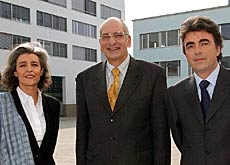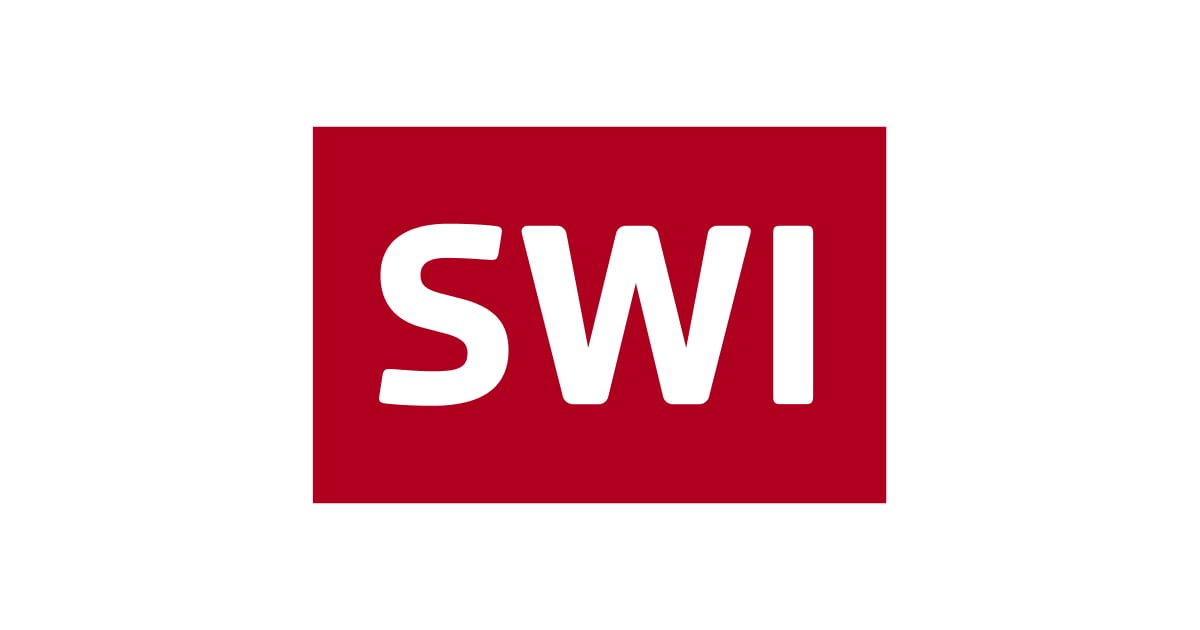Lausanne’s Technology Institute aims for the top

The Federal Institute of Technology in Lausanne celebrated its 150th birthday last week. Already well-known in international circles, it still nurtures global ambitions.
swissinfo spoke to its president, Patrick Aebischer, who aims to make the institute one of the best technical universities in the world.
The Swiss President, Pascal Couchepin, and the French Minister for Research, Claudie Haigneré, attended the celebration. Haigneré was awarded an honorary degree from the institute.
While Aebischer might reject the charge that he has been leading a revolution, things have been changing rapidly at the institute since his arrival.
In charge since March 17, 2000, the 48-year-old neuroscientist is the first president not to have studied at the institute itself.
Aebischer trained first as a surgeon, then went into research and later became a professor at Brown University in the United States.
When he returned to Switzerland, he was one of the founders of Modex, a start-up specialising in dermatological products stemming from biotechnologies.
In his three years at the helm of the institute in Lausanne, he has regrouped the 12 departments into five faculties.
He shifted the architecture faculty to a site in Eclubens and brought the chemistry department to the main campus.
Next year, the institute is hoping to complete its merger with the Swiss Institute for Experimental Cancer Research, an internationally renowned centre.
swissinfo: Patrick Aebischer, you have stated your intention to make the institute one of the ten best technical universities in the world…
Patrick Aebischer: This kind of ranking is always difficult to achieve. But one could perhaps say we’re already in the champions’ league. Certain bodies evaluated some 5,000 of the best institutes in the world and we were in the top 100.
That said, our goal is always to be better. You cannot rest on one’s laurels. And you shouldn’t forget that one of our missions is to bring benefits to the economy and to contribute to the socio-economic well-being of the population.
swissinfo: Do you have the means to carry out your ambitions?
P.A.: We currently find ourselves in a difficult situation. Our success is such that we attract a lot of students. Today, we have 50 per cent more students than we did ten years ago, and in the last few years their numbers have grown by ten per cent each year. And the level of federal funding has not changed at all. So, I believe the country needs to make more of an effort for the sake of our institute and more generally for the entire system of education and research.
swissinfo: The body, Avenir Suisse, has just sounded the alarm over the lack of innovation in Switzerland, pointing in particular to the low level of patent applications lodged in the country.
P.A.: This is a complicated problem. There are many indicators of the quality of science in a country. In terms of published research, Switzerland does relatively well, even if it is being overtaken by other countries that are putting greater emphasis on education and research.
Effectively, if one does not continue to invest significantly, there is a danger of losing a certain competitive edge.
As for patents, what’s important for me is the way in which they are commercially exploited, and not their registration. This means looking at how many are actually used in reality. There is no use in being the first to announce an innovation if it ends up in what I call the “patent graveyard”.
swissinfo: More than half of your professors are from abroad and your students come from 80 different nationalities. Is this rich international mix understood in political circles?
P.A.:To stay at the top, we have to seek out the best professors, who in turn attract the best students. This is fundamental.
It’s a bit like the Alinghi team, which is international but based in Switzerland. The Lausanne institute is fundamentally Swiss but it consists of a multitude of cultures, which is its strength.
Once we have trained people – at public expense – we shouldn’t necessarily ask them to leave straightaway. Those who wish to stay must be able to do so. They are the talent of the future.
In any case, some do leave and that’s fine too because they make excellent ambassadors. One must remember that Swiss industry is essentially an export industry. So, having ambassadors around the world is very important.
swissinfo: What links do you have with the other federal institute of technology in Zurich?
P.A.: In many areas we are working on the same gaps in knowledge, so that creates rivalry. In some cutting edge technologies, there is a certain competition, which is not a bad thing. I believe that monopolies are dangerous, which includes areas like education, research, science and technology.
In Lausanne, as in Zurich, we are completely aware of the need to coordinate our efforts, particularly in the classic areas, where a nationally-recognised level of training is necessary.
Take the example of nuclear energy: one might be for or against but the fact is that today we have a national responsibility to train engineers to be capable of operating nuclear stations and we are involved in this.
swissinfo: It’s hard to ignore current affairs. You have kept in touch with contacts in the United States. What do your American colleagues think about the war in Iraq?
P.A.: Just because the US government has declared war does not mean that people are generally behind it. There is resistance on campuses; it’s frequently here that the first displays of resistance appear in the US.
swissinfo: But you know full well that state-of-the-art weapons which the army may use on the ground have been invented by people who come from establishments like yours…
P.A.: It’s true that science always has two faces. One is very positive and that’s what we would like to be known for.
But it also has a more questionable side and it is this face that stands out today. But we should not forget that military technology, if it is used in a proper way, can also protect a country.
For the Lausanne institute in any case, we refuse to work with foreign governments in military matters.
swissinfo-interview: Marc-André Miserez (translation: Faryal Mirza)

In compliance with the JTI standards
More: SWI swissinfo.ch certified by the Journalism Trust Initiative











You can find an overview of ongoing debates with our journalists here . Please join us!
If you want to start a conversation about a topic raised in this article or want to report factual errors, email us at english@swissinfo.ch.